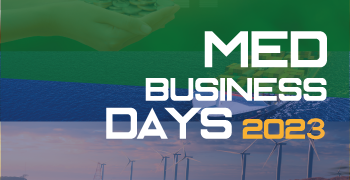
"The Mediterranean basin is one of the most prominent hotspots of climate and environmental change", according to a report by the Union for the Mediterranean. It is the second most impacted area by warming after the Arctic. It accumulates most of the climatic risks and countries bordering the Mediterranean are highly populated.
In this context, The COP 27 was held in a Mediterranean country in Sharm El Shaikh in Egypt where the international community managed to finalize the agreement to finance the damage suffered by vulnerable countries hard hit by climate disasters. Set against a difficult geopolitical backdrop, COP27 resulted in countries delivering a package of decisions that reaffirmed their commitment to limit global temperature rise to 1.5 degrees Celsius above pre-industrial levels. It was a strategic occasion to share expertise, facts and build inclusive processes to highlight the pressing challenges facing the Euro-Mediterranean region.
The European Union commitment via the Green Deal to become carbon neutral by 2050, along with its enhanced focus on the protection of the environment and sustainable development represents a major shift in its growth strategy. The impact of this strategy is not only limited to European Union Members, but it will have effects across entire value chains, across the Mediterranean basin.
Similar efforts can be seen by another major regional organization, the UfM, who 25 years after the launch of the Barcelona process, has set priorities to counteract the effect of climate change within the Mediterranean.
These initiatives at regional level directly align themselves with the UN Sustainable Development Goals, especially SDG 13 which focuses on the fight against climate change.
In this setting, BUSINESSMED will organize a flagship event called MED BUSINESS DAYS 2023, Southern edition: “In the wake of the COP27, how can the private sector address climate change and promote green growth?”. The Roadshow is organized in partnership with its member, the Federation of Egyptian Industries, FEI, within the framework of the EBSOMED project.
The event will take place in Cairo, Egypt on the 15th and 16th of February 2023 and will feature different sessions ranging from keynotes, panels, discussions, B2B meetings and networking opportunities.
The event will be a great opportunity to define common grounds and innovative solutions to foster green transition. It will feature a multitude of panelists from different backgrounds, from different organizations such as banks, international organizations, Business and with a regional south north approach, will be an opportunity to highlight:
- The challenges of the transition process, the benefits of accelerating the green transition and the different opportunities for SMEs and companies in the Mediterranean.
- The opportunity for stakeholders and investors in the migration to sustainable economy therefore the influence for future business practices.
- Explore and expose recommendations to accelerate the transition to the green economy in the Mediterranean area
Challenges and opportunities in the aftermath of the Health and Energy Crisis
Global economic activity is experiencing a broad-based and sharper-than-expected slowdown, with inflation higher than seen in several decades. The cost-of-living crisis, tightening financial conditions in most regions, Russia’s invasion of Ukraine, and the lingering COVID-19 pandemic all weigh heavily on the outlook. According to the IMF, Global growth is forecasted to slow down from 6.0 percent of 2021 to 3.2 percent in 2022 and 2.7 percent in 2023. This is the weakest growth profile since 2001 except for the global financial crisis and the acute phase of the COVID-19 pandemic.
In light of the changes in the global economy that was already underway but have become more significant by the recent events. This session aims to be a space to share expertise, facts and build inclusive processes to tackle these problems. Our speakers will holistically create point out issues in the transition process, benefits of the acceleration of the green transition and the different opportunities for the SMEs & corporate in the Mediterranean.
The Green Transition: a way to build back better
In the face of increasing demographic pressures, growing energy demands due to sustained population growth, and the progressive degradation of the environment, it is imperative to rethink and actively support the transition to a low-carbon economy in the Mediterranean. These effects, in line with an increase interest and concrete action at EU and International level, towards ensuring the success of the Paris Agreement, have made it so that it is imperative to rethink traditional Business Models, and move increasingly towards circularity.
The health and energy crisis which have and are currently impacting our economies, also represent an important opportunity for the Mediterranean basin. From an energy perspective concrete investment in Green and Blue Hydrogen, as well as Solar energy, represent and important opportunity for Southern Mediterranean Countries to position themselves as the main energy provider for the European Continent, while at the same time provide a way to grow and back better, and provide concrete employment opportunities.
During this panel discussion, we will be addressing challenges and opportunities for the Mediterranean basin linked to the green transition, with the aim to define common grounds and innovative solutions to foster green transition across the two shores. Furthermore, we are going to highlight the opportunity for stakeholders and investors in the migration to sustainable economy therefore the influence for future business practices.
Session: How can the private sector address the climate change and promote the green growth
During the second day of the Med Business Days, we will continue the discussions and exchanges between expert and private sector representatives, with the goal of defining concrete recommendations and best practices to promote green growth opportunities.
As the climatic threats are notably growing, demographic pressures and the growing energy demand, it’s imperative to rethink and actively support the green transition in the Mediterranean. The green transition requires strong private sector to support SMEs and business in term of technology and available funding possibility. This round table format will be an opportunity to explore and expose recommendations to accelerate the transition to the green economy in the Mediterranean area.
This session will be split in two parts:
- Part 1: The understanding of the status quo of the Mediterranean private sector in the green transition
- Part 2: The key actions and recommendations to promote the green growth
Session: Business Talks
Within the 2nd day’s agenda of the Med Business Days - South, a special workshop dedicated to the exchange between companies and business accelerators is scheduled.
The ultimate goal of this session is to undertake an interactive discussion between business operators (SMEs, start-ups, companies) from one hand, and financial intuitions, investors and business incubators, on the other hand. Where business operators are entitled to lead a debate on their specific needs in terms of technical accompaniment, financial support (case study approach), while business support institutions are invited to suggest solutions and services that could match the expressed needs.
To ensure the smooth running of the open discussion, adopting a sector-based approach, the participants will be split in 3 work groups namely:
- Renewable energy & Waste management
- Innovative Digital solutions
- Agrifood
A report-back session will be then held to sum-up the key recommendations and to match the common issues reported in all sectors represented.












